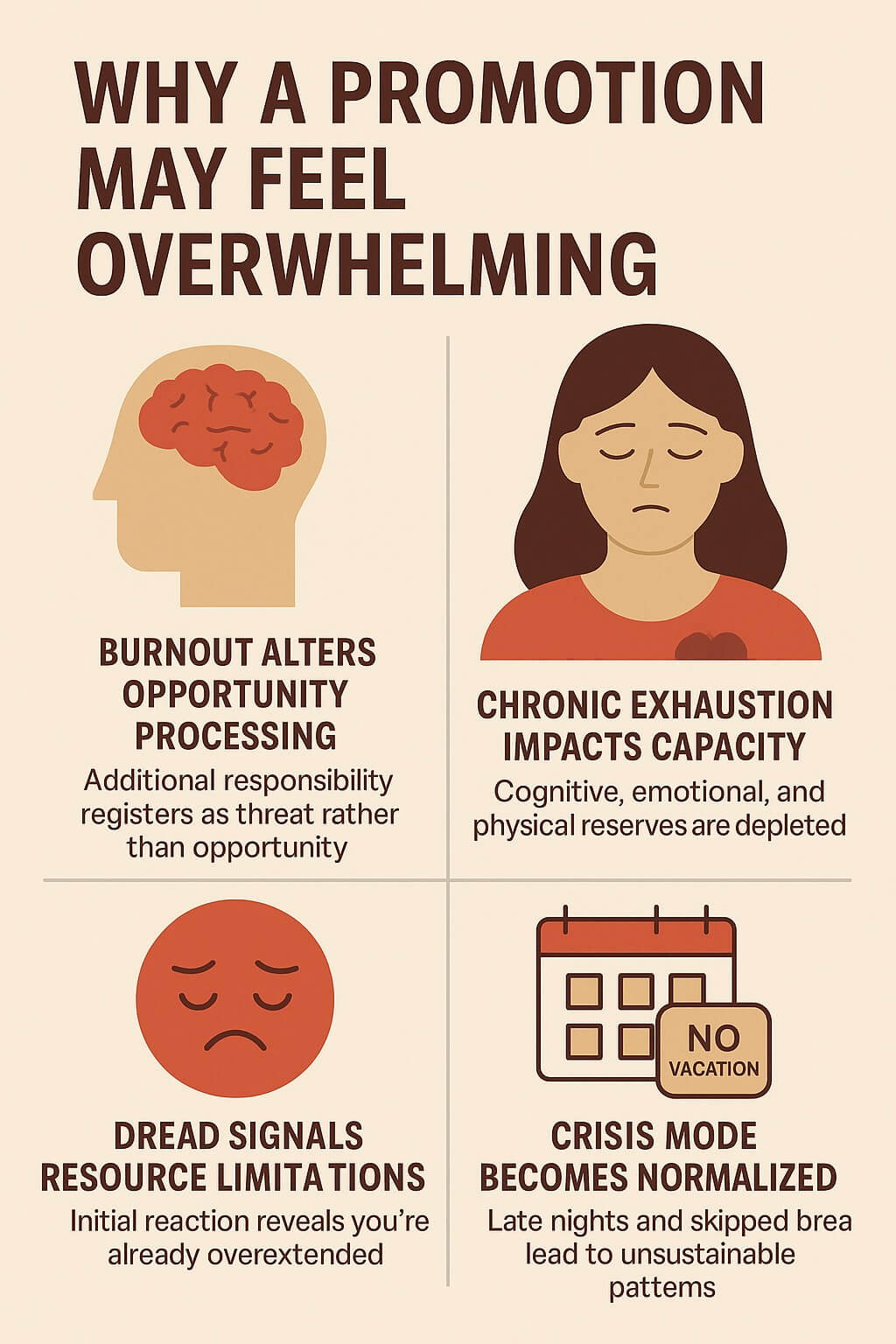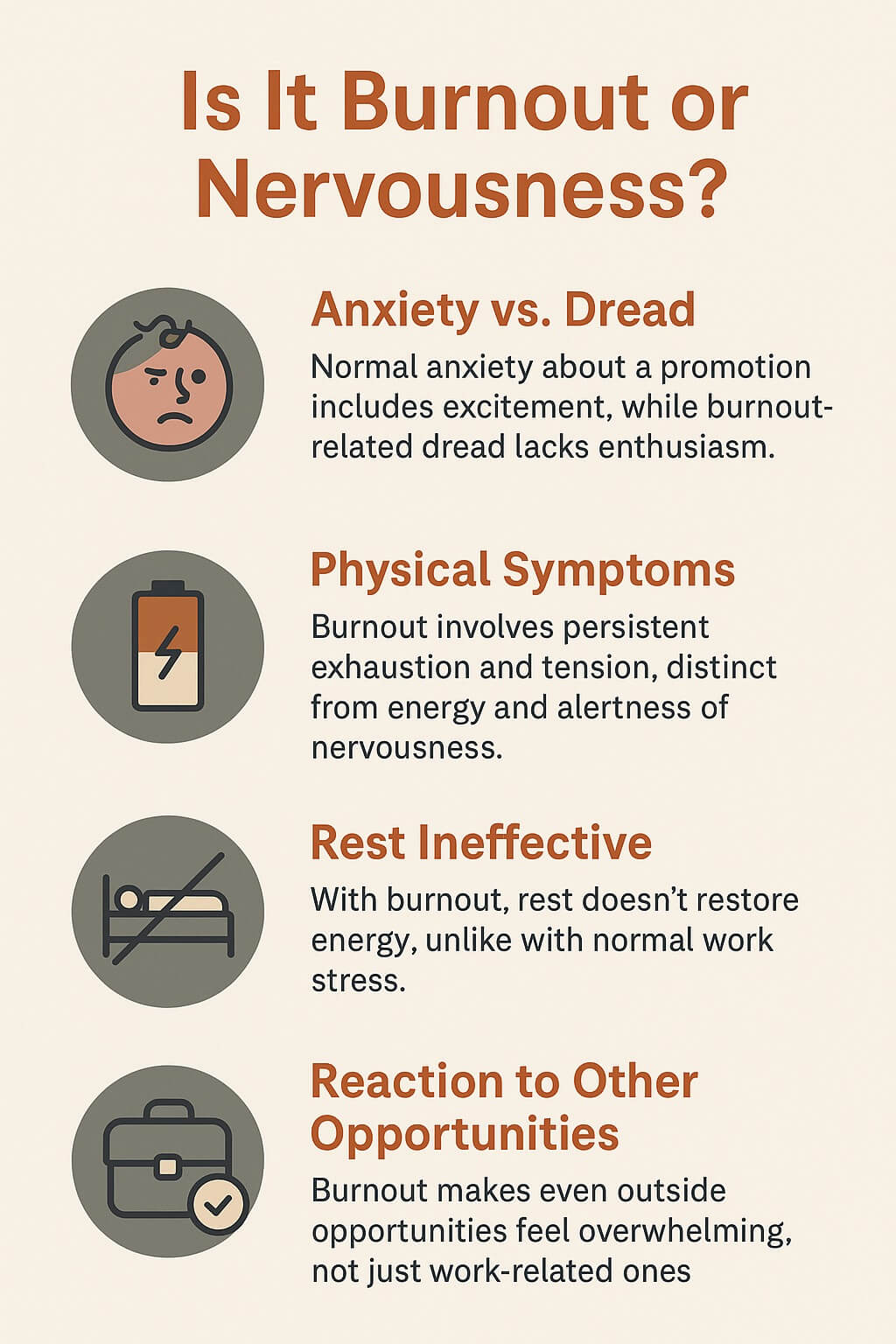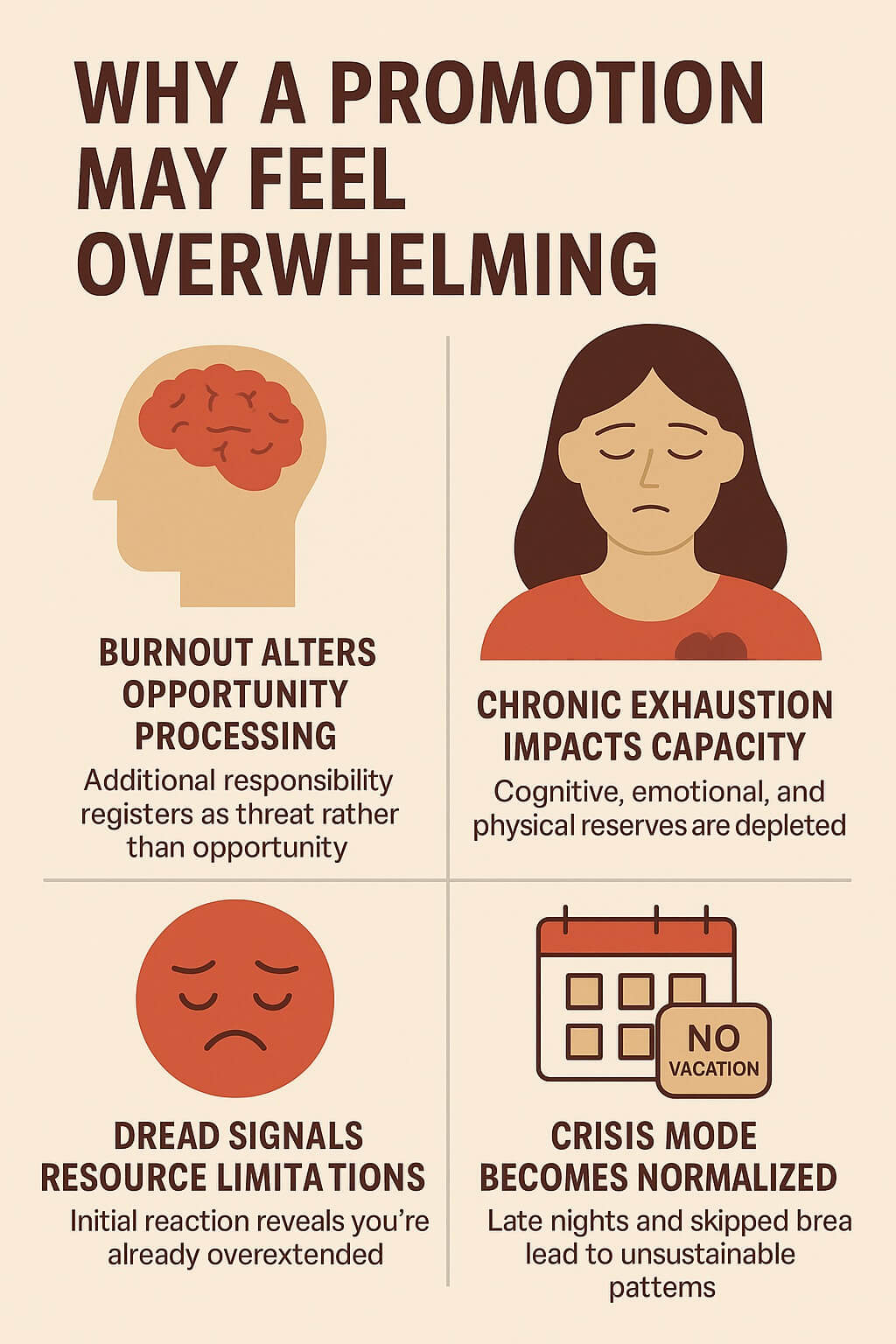The moment a promotion offer lands on your desk should feel exciting, validating, and energizing. Instead, you feel a wave of dread wash over you. Your body tenses. Your mind immediately calculates the cost rather than celebrating the opportunity. This reaction tells you something important about where you actually stand, regardless of what your resume says or what others expect. Declining a promotion isn’t career suicide or a sign of laziness. Sometimes it’s the most intelligent decision you can make, protecting both your health and your long-term career trajectory from a choice that looks good on paper but could break you in reality.
Why does a promotion feel like a burden instead of an achievement?
Burnout fundamentally changes how your brain processes opportunities. When you’re operating at capacity or beyond it, any additional responsibility registers as threat rather than opportunity. This isn’t pessimism or lack of ambition. It’s your nervous system accurately assessing that you don’t have the reserves to handle more demands without serious consequences.
The exhaustion you’re experiencing isn’t just physical tiredness that a good weekend fixes. Chronic work stress depletes cognitive resources, emotional regulation capacity, and physical energy simultaneously. When you’re running on empty, even positive additions to your life feel overwhelming. A promotion that would excite and energize a well-rested version of you triggers anxiety and resistance in your current depleted state.

Your first emotional reaction to news provides valuable data about your actual capacity versus your aspirational self-image. Many high-performing people ignore these initial gut responses, pushing through discomfort because they believe they should want advancement. However, that immediate feeling of dread isn’t random. It’s your body and mind sending urgent signals that your resources are already overextended.
The pattern of late nights, minimal vacation, and weekends spent recovering rather than living indicates you’ve been operating in crisis mode. This becomes normalized over time, making it difficult to recognize how unsustainable your situation has become. A promotion doesn’t just add responsibilities. It typically increases the intensity, stakes, and pressure accompanying those responsibilities. Doubling an already unmanageable workload doesn’t create balance. It accelerates the trajectory toward complete breakdown.
What happens when you accept a promotion while burnt out?
Taking on increased responsibility while depleted sets up a cascading failure pattern. Initially, you might push through on adrenaline and determination, maintaining performance through sheer force of will. This works temporarily, creating the illusion that you made the right choice. However, this isn’t sustainable operation. It’s borrowing energy from future you with interest accumulating daily.
Performance decline eventually becomes unavoidable when operating beyond capacity. The cognitive impairment from chronic stress and exhaustion affects decision-making, creativity, problem-solving, and interpersonal effectiveness. Tasks that should be straightforward take longer and require more effort. Simple mistakes multiply. The quality that earned you the promotion offer begins eroding precisely when you need it most.
Relationships suffer across all areas of life when you accept more than you can handle. Work relationships deteriorate as your depleted state makes you less patient, less collaborative, and less emotionally available. Personal relationships bear the brunt as you have nothing left to give when you get home. The isolation deepens as you withdraw from social connections that feel like additional demands rather than sources of support and renewal.
Health consequences accelerate when chronic stress intensifies. Sleep problems worsen despite increasing exhaustion. Digestive issues, headaches, muscle tension, and immune dysfunction become constant companions. Mental health deteriorates with anxiety and depression emerging or intensifying. These aren’t minor inconveniences. They’re serious medical conditions that can take months or years to fully recover from once they become entrenched.
The irony of accepting a promotion while burnt out is that it often leads to worse career outcomes than declining would have produced. The deteriorating performance, potential mistakes, damaged relationships, and possible health-related absences all create professional consequences. You might end up leaving the role or the organization entirely under difficult circumstances, erasing any benefit the promotion might have provided.
Is declining a promotion actually career limiting?
The narrative that every opportunity must be immediately seized or lost forever creates unnecessary pressure and poor decisions. Career paths aren’t linear progressions where missing one step means permanent stagnation. Real career development happens through sustained performance, skill building, and strategic advancement rather than accepting every opportunity regardless of timing or fit.
Organizations that punish employees for honest assessment of their capacity aren’t places where you’ll thrive long-term anyway. Healthy workplaces recognize that sustainable performance requires matching demands to capability and capacity. Managers who respect boundaries and honest communication create environments where people can have long, productive careers. Those who interpret reasonable limits as lack of ambition typically foster toxic cultures with high turnover.
Accepting a role you can’t handle successfully often damages your career more than thoughtfully declining. Struggling visibly in a promoted position, making mistakes due to overextension, or having to step back down after accepting all create more negative impressions than saying no initially. Maintaining strong performance in your current role while rebuilding capacity positions you better for future advancement than failing in a role you weren’t ready to take on.
Your value to an organization extends beyond your willingness to accept any assignment. The skills, knowledge, and relationships you’ve built have intrinsic worth. A single declined promotion doesn’t erase years of strong performance. It demonstrates self-awareness and good judgment, qualities that become increasingly important in leadership positions.
The concept of “unambitious” deserves examination. True ambition includes the wisdom to build a sustainable career rather than burning bright briefly before flaming out. Marathon runners don’t sprint the entire race. They pace themselves strategically to finish strong. Career ambition should operate similarly, with thoughtful decisions about when to push forward aggressively and when to consolidate gains before the next advance.
How do you know if it’s actually burnout or just nervousness?
Normal pre-promotion anxiety feels different from burnout-related dread. Nervousness about new responsibilities typically comes with underlying excitement and curiosity. You worry about whether you’ll succeed, but you want to try. The fear feels proportional to the challenge, and you can imagine scenarios where things go well. This anxiety often decreases as you learn and adapt to the new role.
Burnout-related resistance to advancement presents as heavy, exhausted opposition rather than nervous energy. There’s no excitement underneath the dread. You can’t imagine positive scenarios because you lack the energy to envision anything beyond survival. The thought of additional responsibilities feels crushing rather than challenging. This isn’t about capability doubt. It’s about having nothing left to give.

Physical symptoms distinguish anxiety from burnout. Nervousness typically manifests as butterflies, increased energy, and activated alertness. Burnout shows up as bone-deep tiredness, difficulty concentrating, persistent tension that won’t release, and a constant feeling of running on empty. Your body can’t generate the activation response anxiety produces because your stress response system is already depleted.
Your current relationship with rest provides diagnostic information. People experiencing normal work stress still enjoy and benefit from time off. They recharge on weekends and return somewhat refreshed. Burnout renders rest ineffective. You spend your free time recovering just enough to get through the next week rather than actually restoring your energy. Vacations don’t help because the deficit is too deep for a week or two to repair.
Consider your reaction to other opportunities outside work. If you feel enthusiastic about personal projects, social activities, or hobbies but only dread work-related advancement, that pattern suggests burnout specifically related to your job situation. If everything feels overwhelming regardless of domain, that indicates deeper exhaustion requiring more comprehensive intervention.
What are the warning signs you’re too burnt out for more responsibility?
Cognitive changes often appear before people consciously recognize burnout. Difficulty concentrating on tasks that used to absorb you easily signals depleted mental resources. Forgetting routine information, missing deadlines despite careful planning, or making uncharacteristic mistakes all indicate your brain isn’t functioning at normal capacity. These aren’t character flaws. They’re physiological responses to chronic overload.
Emotional flatness where you feel nothing about work that used to engage you suggests significant depletion. This isn’t the same as occasional boredom or frustration. It’s a persistent numbness where successes don’t feel satisfying and challenges don’t spark motivation. You go through motions competently but mechanically, disconnected from any sense of purpose or achievement.
Physical exhaustion that persists despite adequate sleep indicates systemic stress rather than simple tiredness. Waking up still tired, needing caffeine to function throughout the day, experiencing afternoon crashes, and feeling heavy exhaustion by evening all point to depleted physical reserves. Your body is spending more energy than it can replenish through normal rest.

Increased cynicism and negativity about work, colleagues, or the organization represents emotional exhaustion. You find yourself increasingly irritable, impatient, or critical. Things that wouldn’t have bothered you before now trigger disproportionate frustration. This isn’t about becoming a difficult person. It’s about having no buffer left to handle normal workplace friction.
Withdrawal from colleagues and social isolation at work signals that connection has become draining rather than energizing. You eat lunch alone, skip optional meetings, and minimize small talk. The people skills that once came naturally now require conscious effort you don’t have. Relationships feel like additional demands rather than sources of support.
The fantasy of escape grows increasingly vivid and frequent. You catch yourself daydreaming about quitting, getting sick, or other scenarios that would extract you from your situation. You research other jobs compulsively without necessarily applying. You calculate how long you could survive on savings if you just left. These escape fantasies indicate your mind seeking any relief from unsustainable circumstances.
Can you negotiate a different version of the promotion?
The binary choice between accepting or declining a promotion sometimes obscures creative middle paths. Many organizations will negotiate modified terms if you advocate for yourself clearly and constructively. Expressing enthusiasm for advancement while naming specific concerns about workload demonstrates maturity and self-awareness rather than lack of ambition.
Proposing a gradual transition allows you to grow into expanded responsibility sustainably. Perhaps you take on some leadership duties while remaining at your current workload level initially, with full promotion following a defined period. This provides time to build capacity and skills without the immediate overwhelm of doubling your responsibilities.
Requesting additional support might make the promotion viable. This could include hiring another team member, redistributing responsibilities differently than proposed, or securing commitments about workload boundaries. Organizations serious about your development often provide resources to support promoted employees, but you must ask clearly for what you need.
Negotiating a delayed start date creates space to address your burnout before taking on more. Express interest in the role while asking to postpone by three or six months, using that time to take accumulated vacation, reduce current workload, and restore your capacity. This demonstrates strategic thinking and honest self-assessment rather than declining the opportunity entirely.
Modified role definitions sometimes better match your strengths and available capacity. The initial proposal might include elements you’re less interested in or equipped for. Discussing adjustments to responsibilities, reporting structures, or expectations could create a promotion that excites rather than overwhelms you.
Compensation increases without expanded responsibilities represent another negotiation path. If the promotion primarily recognizes your value and contributions rather than requiring doubled workload, perhaps the pay raise and title change can happen without the crushing addition of responsibilities. Organizations wanting to retain good people sometimes accommodate these requests.
How do you communicate declining without burning bridges?
Framing your decision positively focuses on what you’re choosing rather than what you’re rejecting. Express appreciation for the recognition and opportunity while explaining that you want to continue excelling in your current role. Emphasize your commitment to the organization and the team rather than making it about what the promotion lacks.
Honesty about your current capacity, delivered professionally, often generates respect rather than disappointment. Explain that you’ve been operating at an unsustainable pace and need to restore balance before taking on additional responsibility. Most reasonable managers appreciate self-awareness that prevents future performance problems.
Expressing future interest keeps doors open without committing to immediate acceptance. Indicate that you’d like to be considered for similar opportunities once you’ve had time to build capacity and address your current workload situation. This shows ambition while setting appropriate boundaries in the present.
Offering alternatives demonstrates commitment despite declining. Perhaps you can mentor someone else stepping into the role, take on a specific project related to the promotion’s responsibilities, or contribute to the team’s success in other ways. This shifts the conversation from what you can’t do to what you can offer.
Avoiding over-explanation prevents defensive or apologetic tones that might undermine your message. You don’t need to justify your decision exhaustively or convince anyone you’re making the right choice. A clear, respectful explanation is sufficient. Excessive justification can inadvertently signal uncertainty about your decision.
Maintaining consistent performance after declining proves your decision wasn’t about avoiding work or lacking commitment. Continue contributing at the level that earned you the promotion offer. This demonstrates that your boundary was specific and thoughtful rather than indicating broader disengagement.
What should you do instead of accepting the promotion?
Addressing the underlying burnout becomes the immediate priority when you decline additional responsibility. This isn’t something that fixes itself with time alone. It requires active intervention including setting clearer boundaries, using accumulated vacation, and potentially reducing current commitments where possible.
Taking significant time off allows initial recovery even if it doesn’t fully resolve burnout. Use vacation days you’ve been hoarding, potentially taking a full week or two completely disconnected from work. This creates space for your nervous system to begin downregulating from constant activation. Real rest means truly unplugging rather than checking email occasionally or remaining mentally engaged with work problems.
Restructuring your current role to sustainable levels prevents continued deterioration while you recover. This might mean delegating tasks you’ve been handling alone, setting clearer time boundaries, or having honest conversations about workload with your manager. The habits and patterns that led to burnout must change even if your role stays the same.
Building recovery practices into daily life supports gradual restoration of capacity. This includes prioritizing sleep, reintroducing physical movement, reconnecting with relationships, and engaging in activities that genuinely renew you rather than just passing time. Recovery isn’t something that happens automatically during downtime. It requires intentional cultivation.
Exploring what you actually want from your career provides direction beyond simply declining one opportunity. The promotion might not align with your interests and values even if burnout weren’t a factor. Use this decision point to clarify what advancement would look like on your terms rather than accepting whatever gets offered.
Developing skills and relationships in your current role strengthens your position for future advancement. Just because you’re not taking this promotion doesn’t mean you stop developing professionally. Identify growth opportunities within your current scope that build capability without overwhelming you.
Is it normal to feel guilty about prioritizing your wellbeing?
Cultural narratives about ambition and success create guilt around reasonable boundaries. We’re taught that opportunities should always excite us, that advancement should be pursued regardless of personal cost, and that prioritizing wellbeing over career progression indicates weakness or lack of drive. These narratives serve organizational productivity but often sacrifice individual sustainability.
High-performing people frequently struggle with guilt around self-care because their identity connects strongly to achievement and others’ expectations. Saying no to opportunities feels like betraying who you are or disappointing people who believed in you. This guilt isn’t evidence you’re making the wrong choice. It’s evidence that you’re challenging internalized narratives that may not actually serve you.
The guilt often intensifies when you compare yourself to others who seem to handle similar or greater responsibilities without strain. This comparison ignores important differences in circumstances, support systems, previous capacity levels, and personality factors. Someone else’s ability to take on a demanding promotion doesn’t mean you should be able to do the same at this moment in your life.
Organizations benefit from employees feeling guilty about boundaries because that guilt overrides healthy self-preservation and perpetuates unsustainable work cultures. Recognizing this dynamic doesn’t eliminate guilt immediately, but it helps you understand that the guilt serves organizational interests rather than your actual wellbeing.
Reframing self-care as responsibility rather than indulgence shifts the guilt narrative. Maintaining your health and capacity allows you to contribute sustainably over the long term. Running yourself into the ground might look impressive temporarily but ultimately serves no one, including your organization. Taking care of yourself is actually the more responsible choice.
How long does it take to recover from serious burnout?
Burnout recovery timelines vary significantly based on severity, how long you’ve been burnt out, and what resources you can access for recovery. Mild burnout caught early might resolve in weeks or a few months with appropriate intervention. Moderate burnout typically requires three to six months of active recovery. Severe burnout that’s been developing for years can take a year or more to truly resolve.
Initial energy improvements often happen within weeks of reducing demands and prioritizing rest, creating false optimism about full recovery. This early phase involves nervous system downregulation and catching up on sleep debt. However, deeper healing of stress response systems, restoration of cognitive function, and rebuilding emotional reserves takes substantially longer.
The non-linear nature of burnout recovery frustrates people expecting steady progress. You might feel significantly better for a period, then experience setbacks where exhaustion and overwhelm return. This doesn’t mean recovery isn’t happening. It reflects the complex physiological and psychological changes involved in genuine healing.
Continuing to work while recovering from burnout obviously extends the timeline compared to taking leave. Some people need to step away from work entirely for a period to create space for real recovery. Others can recover while working if they’re able to significantly reduce demands and maintain strict boundaries.
Full recovery means more than just absence of exhaustion. It includes restored enthusiasm, reliable cognitive function, emotional resilience, and the capacity to handle challenges without immediate overwhelm. You’ll know you’ve recovered when normal work demands feel manageable rather than threatening and when you can access excitement about opportunities instead of just dread.
What if declining the promotion changes how people see you?
Perception management concerns feel important but often matter less than we imagine. Most colleagues are focused on their own work and challenges rather than analyzing your career decisions. The people whose opinions truly impact your experience typically respect thoughtful boundary-setting more than reflexive yes-saying to every opportunity.
Your manager’s response provides important information about the relationship and organization. Supportive managers appreciate honesty and respect capacity limits because they understand that pushing people beyond their limits creates worse outcomes than temporary disappointment. Managers who react negatively to reasonable boundaries reveal themselves as people you shouldn’t be trying to impress anyway.
Colleagues who judge you for prioritizing wellbeing over advancement likely struggle with their own boundaries and may be projecting their discomfort onto you. People secure in their choices don’t typically judge others for making different decisions. The criticism often reflects their own internal conflicts about work-life balance.
Building a reputation for sustainable high performance serves you better long-term than building a reputation for accepting anything regardless of cost. Organizations and managers cycle through over time. Your health and capacity remain with you throughout your career. Protecting those assets demonstrates wisdom that will serve you across decades of work life.
Some perception changes might actually benefit you. Declining a promotion can establish you as someone with clear boundaries and self-awareness, qualities that become increasingly valuable in senior roles. It demonstrates that you think strategically rather than reactively about your career.
Can you ask for the promotion again later?
Future promotion opportunities depend partly on your performance and relationship with the organization moving forward and partly on organizational needs and timing. Maintaining strong performance in your current role keeps you visible as a candidate when opportunities arise again. Declining once doesn’t permanently disqualify you if you handle it professionally.
Having an explicit conversation about future timeline expectations helps clarify whether this is a temporary no or creates longer-term complications. Ask when similar opportunities might arise again and what you’d need to demonstrate to be reconsidered. This shows forward thinking while honoring your current limitations.
Organizations committed to developing their people understand that timing matters for advancement. Good companies prefer to promote people when they’re ready rather than losing them to burnout. If your organization doesn’t share this perspective, that information helps you make longer-term career decisions.
Your own timeline for feeling ready matters more than organizational preferences. Even if another opportunity arises quickly, don’t accept it unless you’ve genuinely recovered capacity and enthusiasm. Accepting too soon to avoid perception problems just recreates the original dilemma.
Building toward the specific promotion you want rather than accepting whatever gets offered creates more satisfying advancement. Use the time between declining and being ready to develop skills, demonstrate capabilities, and clarify what you actually want your career to look like.
What does sustainable career advancement actually look like?
Sustainable advancement matches increasing responsibility to genuinely increasing capacity rather than just willpower and tolerance for suffering. This means building skills and energy before taking on new challenges rather than hoping you’ll figure it out under pressure. Strategic advancement includes recovery and consolidation periods between growth phases.
Career paths that maintain wellbeing prioritize fit and interest alongside external markers of success. A promotion might look impressive but create daily misery if the work doesn’t engage you or the environment drains you. Sustainable careers align responsibilities with what actually energizes and motivates you rather than just chasing titles and compensation.
Setting boundaries around workload, hours, and availability at every career stage prevents the accumulation of unsustainable expectations. The habits you establish in junior roles often persist as you advance unless you intentionally change them. Practicing boundary-setting when stakes feel lower prepares you to maintain boundaries as responsibilities increase.
Investing in relationships and support systems throughout your career creates resources that sustain you during demanding periods. Isolation and total work focus might seem efficient short-term but leaves you vulnerable during challenges. Maintaining connections outside work and building genuine relationships with colleagues provides crucial buffering.
Regular assessment of whether your career serves your broader life goals prevents autopilot advancement that looks successful externally while leaving you empty internally. Checking in with yourself annually or at major decision points helps ensure you’re building toward something meaningful rather than just accumulating achievements.
How do you know when you’re ready for advancement again?
Physical energy restoration shows up in sustainable alertness throughout the day, refreshing sleep, and weekends that feel rejuvenating rather than merely survival focused. You wake up with energy rather than dread. You can engage fully in activities outside work rather than being too exhausted for anything beyond passive recovery.
Cognitive function returning to baseline manifests as easier concentration, better memory, faster problem-solving, and mental clarity. Tasks that felt overwhelming become manageable again. You can hold multiple considerations in mind simultaneously rather than feeling constantly overwhelmed. Creative thinking returns after long absence.
Emotional engagement with work resurfaces when you’re recovering. You notice yourself caring about outcomes again, feeling satisfaction from accomplishments, and experiencing curiosity about challenges. This differs from the numb competence of burnout where you function adequately but feel nothing about the work.
Excitement about growth opportunities replaces dread of additional demands. When you hear about new projects or responsibilities, your first reaction includes interest and curiosity alongside realistic assessment of demands. The heaviness and resistance of burnout gives way to genuine consideration of whether something fits.
Relationships feel nourishing rather than draining. You have energy for friends and family rather than withdrawing into isolation. Work relationships feel collaborative and positive rather than being additional burdens you must manage. Your capacity for connection has been restored.
The genuine desire for new challenges emerges organically rather than being forced by should statements. You find yourself thinking about next steps, imagining possibilities, and wanting to develop new skills. This differs from the guilty feeling that you should want advancement despite actually feeling nothing but dread.
